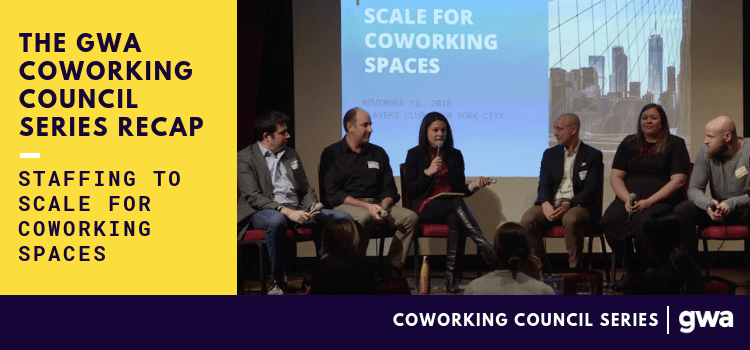The Global Workspace Association took its Coworking Council Series on the road this month to New York. Executive Director Jamie Russo was joined by five North American coworking owners and operators to discuss experiences they’ve had staffing their coworking spaces as they scaled their businesses.
Shlomo Silber, Co-Founder and CEO, of Bond Collective, Ashley Buckner, SVP of Sales and Operations of Carr Workplaces, Kane Wilmott, Co-Founder and CEO of iQ Offices, Bill Jacobson, Founder of Workbar, and Justin Stewart, Co-founder and President of Industrious, shared their lessons learned, stories and food for thought about the challenges of scaling their multisite coworking operations.
Lessons Learned from Coworking Experts
The event’s panelists come from a variety of backgrounds – technology, serial entrepreneurship and construction to name a few – but they share the growing pains and lessons learned in their journey of growing a successful coworking operation.
“Learn your lessons early on.” Shlomo Silber, Bond Collective
While nobody tries to make mistakes, Shlomo advised aspiring coworking operators to learn their lessons in the early moments of growth, rather than later on. Once you begin expanding, you’ve got more at stake to lose.
“Consider culture fit” – Ashley Buckner
When expanding a coworking operation and scaling your team, Ashley Bucker suggests evaluating the candidate from a culture perspective. “Hiring people from the outside industry” can be a mistake. For Carr – and the majority of the coworking spaces represented on the panel – hospitality is a vital part of the core requirements for a new hire. If you can’t bring someone in from the coworking industry, look for candidates with service and hospitality backgrounds.
“Don’t take too much on alone” – Shlomo Silber
Many coworking space operators begin with a shoe strap budget and run lean, putting off important investments that could offer great ROI in the future. Shlomo Silber advises outsourcing important aspects of the business. “You can’t be the construction, design, HR and managing team” at the same time. Relying on trusted third-party experts to run technology, marketing, or design elements of your business can save you time, frustration, money and peace of mind down the line.
“Take your core team to where you’re launching” Kane Wilmott, iQ Offices
Expanding your coworking operation and opening new locations means you’ll need to replicate your existing operation, adding multiple layers of complication to your business – logistics, technology, tax, staff and more. Because the people working at your coworking space are such a key component of success for your brand and reputation, it’s important to get it right. Focusing on catering to the local market by hiring someone local may result in sacrificing a good culture fit, which can create inconsistencies in service and brand identity during an important phase of your growth plan.
Promoting someone from within your organization who understands your culture may be your best bet to open and run a new location. The benefits of sending a trusted, longtime employee to get your new workspace off the ground is that they know your operation, they understand your story and the service you want for your customers. It also helps you to maintain flavor and feel of your community and culture.
Triggers for Growth
Scaling your coworking operation isn’t always the obvious choice. Spending money and allocating precious budget to new or different areas of your business is often a step that requires perspective and time before making the decision. The panelists shared the following advice for taking big steps during their growth plan.
When they’ve been doing it longer than you have
When Justin Stewart and co-founder Jamie Hodari started Industrious, they were serial entrepreneurs who spotted a gap in the market for a professional, service-focused workspace brand. During their expansion process, they came to the realization that they needed a COO – someone experienced who they could confide in to run the company. Chief Operating Officer is a big role, but they realized they needed someone whose longtime expertise in running a business would alleviate the strain of doing it from their shoulders.
When your business needs layers
Carr Workplaces doubled their portfolio by way of acquisition. While a victory for their business, it also prompted the need for new layers within the business to manage the breadth of expansion they were undertaking. On top of community managers for locations across their workspace portfolio, they hired general managers and regional managers to oversee their expansive network of 26 locations, and established processes around geography and task-based roll-up within their org chart.
For Bond Collective expanding their operation required not only layers of teams and processes but a reporting structure for geographically dispersed teams. Having a crystal-clear idea of your business model and plan is vital to scaling your staff and operation.
When you agree to a big partnership
If you’re partnering with a well-known organization – or making any high-visibility change to your business like securing funding, breaking into a new market, making a big hire – you may need some additional support in specific areas of your business, such as marketing or PR. Bill Jacobson of Workbar realized their marketing needed quite the push when he partnered his coworking brand with Staples.
It was the catalyst during Workbar’s growth that drove him to outsource marketing, keeping sales management internal. Letting others do the heavy lifting allows you to focus on other key pillars of your business. That said, when any area of your businesses is underperforming, causing you anxiety, or not delivering on member experience, you know it needs some TLC – especially when you’re in growth mode.
Tips and Tricks to Staffing your Coworking Space
There’s no science to running a coworking space. However, taking notes from the victories and failures of others offers the practical insight for dos, don’ts and tricks to avoid painful and costly mistakes. The event’s panelists offered the following general advice about staffing while you scale your coworking business.
The Jack of all Trades shouldn’t be a permanent position
As with many organizations, operating on a tight budget means you run lean and depend on a handful of dedicated, hands-on, and resourceful people to run your coworking space. Kane Wilmott highlighted the importance of building out components of the business with a dedicated employee or team so that each area is more efficient. It’s better to have someone doing one thing extremely well than many things not so well. In fact, the impact is easily reflected in the quality of the services offered to your coworking members.
Be particular about big hires
As you scale your coworking business, you’ll need to make the big, costly hires to run the core pillars of your organization. Shlomo Silber and Bond Collective insist on making hires that understand the culture within the organization and making sure a candidate will mix in with their “eclectic team of skilled and passionate individuals”. After all, your employees are your most valuable asset. Be willing to hire from within and encourage employee retention, enabling employees to fulfill a passion and contribute ideas, opinions, and values across different areas of the business.
Go above and beyond the core coworking product
Coworking is a growing market and is getting mainstream attention from CRE stakeholders, putting operators at a unique advantage to expand their service offering to cater to a wide range of occupier services. Consider not only delivering on the coworking element of your brand but also filling the gaps that landlords and building managers can’t.
Justin Stewart, co-founder of Industrious, used the term “amenitizing buildings” and referenced such things as events, food and beverage and wellness as a few examples of how coworking operators can extend greater value to all occupiers of their building, beyond solely the tenants of their spaces. It’s a win-win-win – offer greater value to both landlords and occupiers while the coworking operator drives new and higher revenues.
Consider new roles for your coworking operation
During a growth phase, you may eventually find gaps in skills and expertise within your existing org chart. Whether it stems from running a niche coworking brand, focusing on design or hospitality as your core differentiator, or the need for an in-house team, it’s important to acknowledge the skill gap and fill the need. When evaluating the decision to hire for the new role of construction manager at iQ Offices, Kane Wilmott evaluated the following: is the hire worth the investment and is the role sustainable? For iQ Offices, putting a dedicated employee on the payroll in that area of the business translated into expedited and organized projects. An investment-worthy decision the business was ready to take.
Workbar brought on a Head of Real Estate as they expanded their business knowing that it was a big job that carried a lot of weight. Bill Jacobson explained, “if it’s not your area of expertise, hire someone and really entrust the responsibility to them.”
For Bond Collective’s design-focused coworking brand, the results of an outsourced design team fell short of what they had envisioned for their brand. Building out an in-house design team was a no-brainer. They even built a war-room to evaluate important design decisions before implementing.
Recognize hard work
It’s well known that a community manager isn’t the best-paid position on the payroll. Yet it demands a special kind of person to be resourceful, identify with your brand, and treat your customers with consideration and care. All of that with few opportunities for growth. Ashley Buckner and the team at Carr recognized the lack of growth opportunities within the organization and created them. Offering internal promotions without changing the role structure was a first step in recognizing employees’ hard work and therefore retaining talent within the organization.
Coworking Staffing: Hospitality is Key
The five multisite coworking space experts on the panel agreed that hospitality and service are two key components for a coworking space. Hiring staff that has experience in the hospitality industry—whether hotels, restaurants or any other service environment—will help to deliver an excellent member experience. “Managing accountability for hospitality and experience stems from the top,” said Justin Stewart of Industrious. Whether you’re the CEO, founder or a regional manager, the focus on and adherence to high levels of service and hospitality should be tangible and consistent at every workspace across your coworking portfolio at all times.
This gues![]() t blog post was written by essensys, the world’s leading coworking software and technology to power your workspace business.
t blog post was written by essensys, the world’s leading coworking software and technology to power your workspace business.




